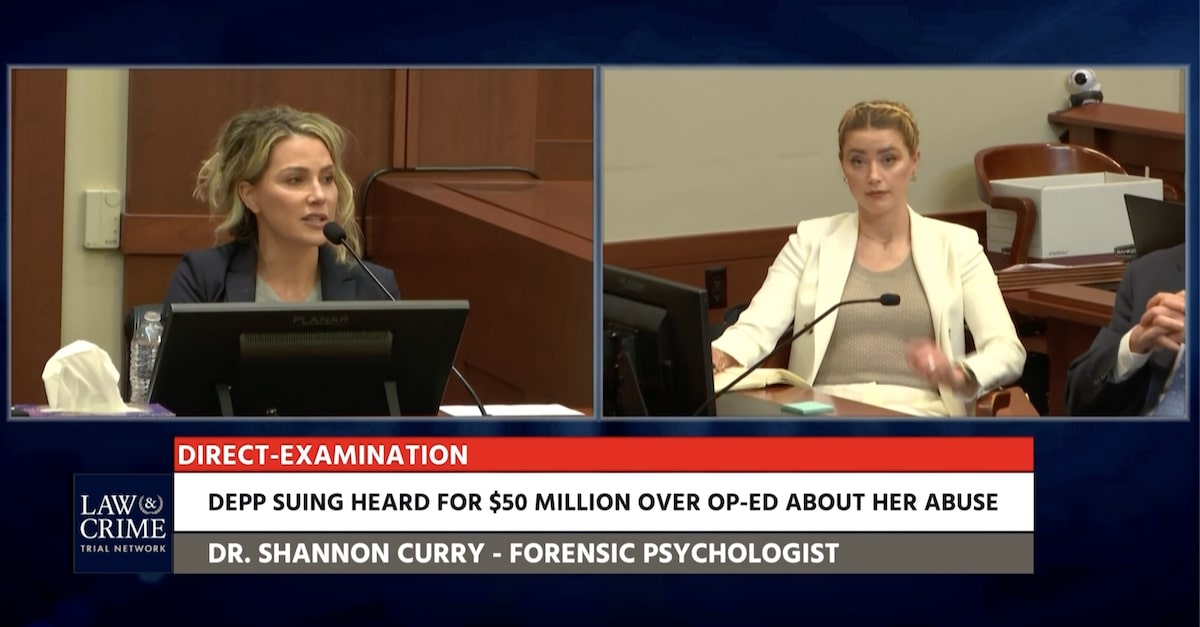
Dr. Shannon Curry testifying about her diagnosis of Amber Heard.
A forensic psychologist called by Johnny Depp’s legal team testified on Monday that she diagnosed his ex-wife Amber Heard with borderline personality disorder and histrionic personality disorder—but she disputed that the actress suffered from post-traumatic stress disorder.
First contacted by Depp’s lawyer Camille Vasquez, psychologist Shannon Curry testified that she based such assessments in part on two psychological tests administered on Heard and a pair of lengthy sessions that lasted a cumulative 12 hours. Both diagnoses appear back-to-back among “Cluster B Personality Disorders” listed in the American Psychiatric Association’s most recent Diagnostic and Statistical Manual of Mental Disorders: the DSM-5.
In addition, Curry testified that Heard “grossly exaggerated” supposed symptoms of post-traumatic stress disorder, which she flatly stated Heard “did not have.”
On cross-examination, Curry acknowledged that she is not board certified and that she was retained after dinner and drinks with Depp’s legal team at his home.
Curry’s testimony fell one day after Depp took to the witness stand in support of his defamation claims against Heard, who accused him of domestic abuse. Depp, who claims that he is the victim of domestic abuse, alleges that Heard fabricated that story when it became clear that he wanted to divorce her.
For people with borderline personality disorder, Curry noted, the animating fear is one of abandonment.
“All of it is like pistons of an engine, kind of firing off and igniting one another,” Curry testified. “But when somebody is afraid of being abandoned, by their partner or by anybody else in their environment and they have this disorder, they’ll make desperate attacks to prevent that from happening. And those desperate attempts could be physical aggression, it could be threatening, it could be harming themselves, but these are behaviors that are very extreme and very concerning to the people around them.”
Curry said that the same rage that borderline personality disorder engenders can provoke the abandonment that terrifies the individual.
“Over time, the anger—the explosive anger—that they show when somebody is needing space, or when somebody is really not doing anything wrong, because a lot of times they read into things that they perceive as being a slight to them or being somebody intending to harm them that actually isn’t happening. They’ll exaggerate it, and they’ll explode. They’ll react in this heightened manner that is just exhausting for their partners.”
In order to prevent the abandonment they fear, Curry testified, a person with borderline personality disorder may resort to violence, both literal and “administrative.”
“One of the most common tactics that they’ll use is actually physically assaulting and then getting harmed themselves, but mostly, we call this ‘administrative violence.’ Essentially this is saying that they’ll make threats using the legal system,” Curry said. “So they might say that they are going to file a restraining order or claim abuse, or they might do these things to essentially try to keep their partner from leaving in the moment.”
In 2016, Heard filed for a restraining order against Depp in Los Angeles, accusing him of domestic violence.
As the two disorders belong to same cluster, Curry said, borderline and histrionic personality disorder can manifest as “two sides of the same coin.”
“With histrionic personality disorder, that underlying drive is to always be the center of attention, because if you don’t have that attention on you, it feels similarly to borderline personality disorder: You feel pretty empty, like you don’t have that sense of being or value,” Curry said, adding that physically attractive people might use their looks to get the attention and respect that they seek.
In reaching these diagnoses, Curry relied in part on a test she administered called the MMPI-2, a set of 567 questions that are short for the Minnesota Multiphasic Personality Inventory. Heard allegedly completed the test on her iPad, and Curry said that she interpreted the results on a 25-page outline.
Using another structured interview known as a CAPS-5, Curry splashed cold water on Heard’s claims to have post-traumatic stress disorder from Depp’s alleged abuse.
“It is one of the most easily faked disorders,” Curry said, referring to PTSD. “Most of us know what it feels like to feel anxious, and a lot of people have seen war movies and movies that depict somebody having PTSD.”
Applying that to Heard, Curry was categorical.
“Ms. Heard did not have PTSD,” Curry said. “And there were also pretty significant indications that she was grossly exaggerating symptoms of PTSD when asked about them.”
Of the core 20 symptoms of post-traumatic stress disorder, Curry said, Heard claimed to have had 19 of them.
“That’s not typical of even somebody with the most disabling form of PTSD,” she said.
Heard’s attorney Elaine Charlson Bredehoft, who accused Depp of sexually assaulting her client with a liquor bottle, started her cross-examination of Curry after the lunch recess.
Learn more about the trial and the “Depp Heads” attending it on Law&Crime’s podcast “Objections: with Adam Klasfeld“:
(Screenshot via the Law&Crime Network)